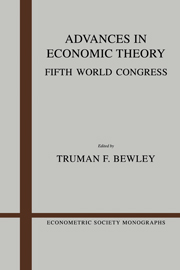Book contents
- Frontmatter
- 1 Auction theory
- 2 Game-theoretic analyses of trading processes
- 3 The theory of contracts
- 4 Battles for market share: incomplete information, aggressive strategic pricing, and competitive dynamics
- 5 A sequential strategic theory of bargaining
- 6 On the complexity of linear programming
- 7 Laboratory experimentation in economics
- 8 Increasing returns and the theory of international trade
- 9 Strategic aspects of trade policy
- 10 Equilibrium without an auctioneer
- 11 Arrow-Debreu programs as microfoundations of macroeconomics
11 - Arrow-Debreu programs as microfoundations of macroeconomics
Published online by Cambridge University Press: 05 January 2013
- Frontmatter
- 1 Auction theory
- 2 Game-theoretic analyses of trading processes
- 3 The theory of contracts
- 4 Battles for market share: incomplete information, aggressive strategic pricing, and competitive dynamics
- 5 A sequential strategic theory of bargaining
- 6 On the complexity of linear programming
- 7 Laboratory experimentation in economics
- 8 Increasing returns and the theory of international trade
- 9 Strategic aspects of trade policy
- 10 Equilibrium without an auctioneer
- 11 Arrow-Debreu programs as microfoundations of macroeconomics
Summary
Introduction
The class of general equilibrium models of Arrow (1964), Debreu (1959), McKenzie (1959), and others is an excellent starting point for the study of actual economies. On the positive side, this class of models can be used to address the standard macroeconomic concerns of inflation, growth, and unemployment, and also more general phenomena such as the objects and institutions of trade, the absence of insurance arrangements of some kinds, or the dispersion of consumption in a population. On the normative side, this class of models can be used to study stabilization policy and optimal monetary arrangements.
Contrary views are often expressed in professional conversations and in the literature. Indeed, the Arrow-Debreu model is often said to be operational only under such unrealistic assumptions as full information, complete markets, and no diversity. Here, however, an alternative view is argued. The Arrow-Debreu model can accommodate not only diversity in preferences and endowments but also private information, indivisibilities, spatial separation, limited communication, and limited commitment. That is, standard results on the existence of Pareto optimal allocations and on the existence and optimality of competitive equilibrium allocations can be shown to apply to a large class of environments with these elements. Further, stylized but suggestive models with these elements can be constructed and made operational so that Pareto optimal and/or competitive equilibrium allocations can be characterized.
- Type
- Chapter
- Information
- Advances in Economic TheoryFifth World Congress, pp. 379 - 428Publisher: Cambridge University PressPrint publication year: 1987
- 11
- Cited by



